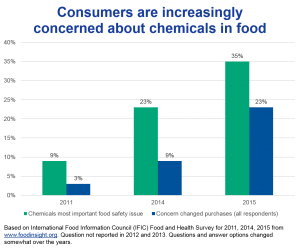Richard Denison, Ph.D., is a Lead Senior Scientist.
Environmental Defense Fund issued the following press release in response to today’s introduction of The Frank R. Lautenberg Chemical Safety for the 21st Century Act [UPDATE: The bill number is S. 697]. We have also prepared an accompanying factsheet and detailed bill analysis [UPDATED to reflect changes in bill as reported out of the Senate Environment and Public Works Committee on April 28, 2015].
Bi-Partisan Chemical Safety Bill
Creates Strong New Protections Against Hidden Health Threats
The Frank R. Lautenberg Chemical Safety for the 21st Century Act Would Overhaul Weak Federal Law, Provide New Powers to Require Safety of All Chemicals
(Washington DC, March 10, 2015)—Senators Tom Udall (D-NM) and David Vitter (R-LA), together with seven Democratic and eight Republican cosponsors introduced legislation today to fix a badly broken system that is currently failing to protect Americans against thousands of untested or hazardous chemicals used in all kinds of everyday products, from cleaning products, to clothing, to couches.
The Frank R. Lautenberg Chemical Safety for the 21st Century Act would overhaul the nearly 40-year-old Toxic Substances Control Act (TSCA), the nation’s primary federal chemical safety law, establishing strong new protections to ensure the safety of chemicals in everyday products. Certain common chemicals are linked to cancer, infertility, diabetes, Parkinson’s and other illnesses. Pregnant woman, infants, and children are especially vulnerable. Under the current law, Americans are exposed to thousands of chemicals every day, only a small fraction of which have ever been adequately reviewed for safety. TSCA is so badly broken that EPA is virtually powerless to restrict even known deadly carcinogens such as asbestos.
Fred Krupp, President of Environmental Defense Fund, said:
“Americans shouldn’t have to worry whether chemicals in their homes pose a threat to their families. With lawmakers coming together from both sides of the aisle, this is the best chance in a generation for us to move past an obsolete and badly broken law to provide strong protections for all Americans. We look forward to working with Senator Udall, the environmental community and other stakeholders to get the strongest bill possible enacted into law. Congress cannot afford to let this historic opportunity slip from its grasp. We owe it to our children and grandchildren to seize the moment and act.”
The new legislation would update the current law and give EPA the tools it needs to ensure the safety of chemicals and significantly strengthen health protections for American families. Notably, the bill:
- Mandates safety reviews for all chemicals in active commerce
- Requires a safety finding for new chemicals before they can enter the market
- Replaces TSCA’s burdensome cost-benefit safety standard—which prevented EPA from banning asbestos—with a pure, health-based safety standard
- Explicitly requires protection of vulnerable populations like children and pregnant women
- Gives EPA enhanced authority to require testing of both new and existing chemicals
- Sets aggressive, judicially enforceable deadlines for EPA decisions
- Makes more information about chemicals available by limiting companies’ ability to claim information as confidential, and by giving states and health and environmental professionals access to confidential information they need to do their jobs
- Provides for the payment of fees by companies to ensure EPA has the resources to carry out its responsibilities
- Ramps up the number of chemicals undergoing safety assessments from an initial 10 to at least 25 chemicals, after all procedures and fees are in place to support the increased level of work
The new legislation is nearly two years in the making and is built on a bill introduced by the late New Jersey Senator Frank Lautenberg and Senator David Vitter in 2013. Negotiations have yielded hundreds of improvements to the original bill.
The new bill significantly reduces the earlier proposal’s preemption of state laws: All state actions taken before 2015 remain intact regardless of subsequent EPA actions. Even after enactment, states can act to restrict a chemical until and unless EPA takes up that same chemical and addresses the same uses. State actions that do not restrict a chemical’s production, distribution or use, or are taken to address a different problem are not affected. No preemption attaches to low-priority designations of a chemical by EPA.
“After nearly four decades under a failed law, this legislation would finally provide EPA with the tools it needs to better protect American families,” said Dr. Richard Denison, Lead Senior Scientist at Environmental Defense Fund. “Rare political circumstances have opened a narrow window to pass meaningful reform that protects the health of American families. It’s essential Congress act now.”
In addition to Sens. Udall and Vitter, original cosponsors include (seven Democrats and eight Republicans): Sens. Joe Manchin (D-WV); Jim Inhofe (R-OK); Tom Carper (D-DE); Roy Blunt (R-MO); Chris Coons (D-DE); John Boozman (R-AR); Joe Donnelly (D-IN); Mike Crapo (R-ID); Martin Heinrich (D-NM); Shelley Moore Capito (R-WV); Heidi Heitkamp (D-ND); John Hoeven (R-ND); Rob Portman (R-OH), Bill Cassidy (R-LA) and Debbie Stabenow (D-MI).
Additional resources can be found on EDF’s website, including a factsheet and detailed bill analysis [UPDATED to reflect changes in bill as reported out of the Senate Environment and Public Works Committee on April 28, 2015].
###
Environmental Defense Fund (edf.org), a leading national nonprofit organization, creates transformational solutions to the most serious environmental problems. EDF links science, economics, law and innovative private-sector partnerships. Connect with us on EDF Voices, Twitter and Facebook.
 ip and public policy. Making our food trustworthy demands leadership in both the private sector and the FDA.
ip and public policy. Making our food trustworthy demands leadership in both the private sector and the FDA.








